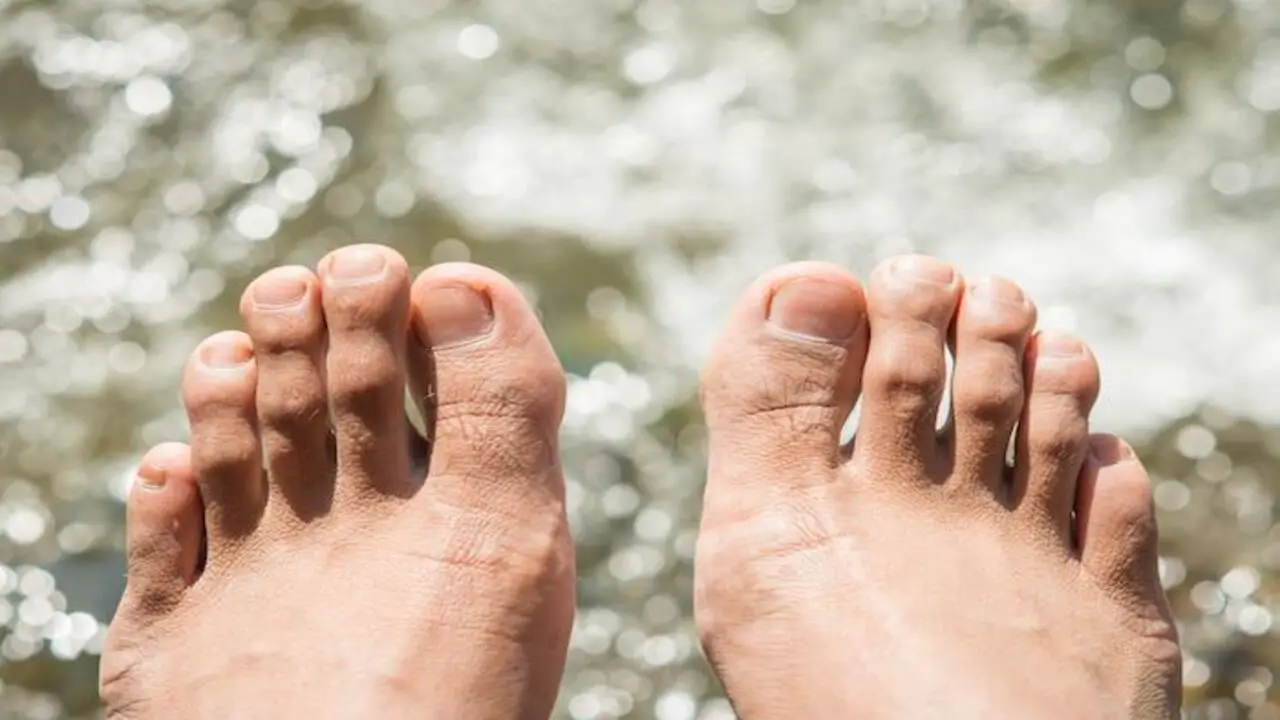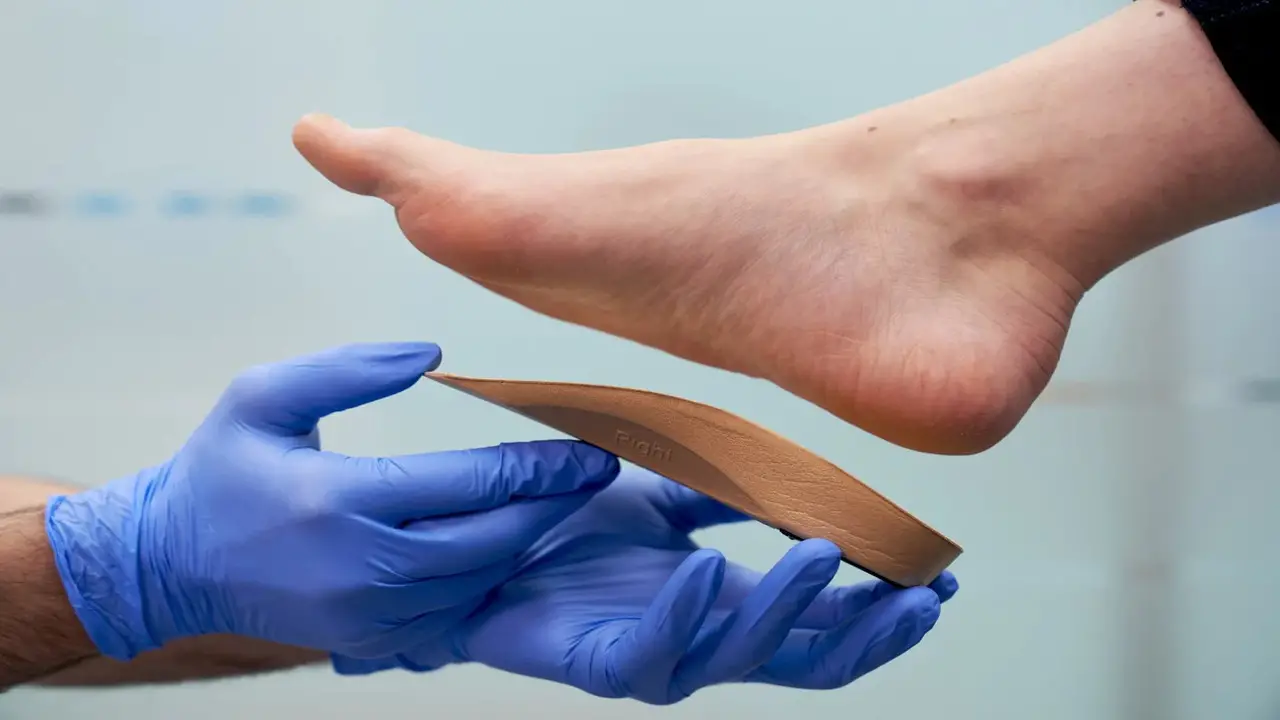Diabetes is a chronic disease that affects millions of people worldwide and can have serious consequences on one’s overall health. Among the many complications brought on by diabetes, foot problems can often go unnoticed but have the potential to become severe if left untreated.
As a result, foot health for diabetics is a crucial aspect of managing this condition. Proper foot care is essential for preventing serious complications such as foot ulcers and infections, which can lead to amputation.
Here, we will discuss the importance of foot health in diabetics and how diabetes can lead to foot problems. We will also provide tips on choosing the right insoles for diabetic foot health, proper foot care routines, preventing complications, recognizing warning signs and seeking medical attention.

The Impact Of Diabetes On Foot Health

Diabetes has a significant impact on foot health, often leading to complications. Nerve damage and poor blood flow are common due to diabetes, affecting the overall health of the feet. High blood sugar levels can also result in diabetic foot ulcers. To prevent complications, proper foot care is crucial for individuals with diabetes. Regular visits to a foot doctor and early treatment of foot problems are essential for maintaining foot health.
How Diabetes Can Lead To Foot Problems
Diabetes can lead to various foot problems due to its impact on the body. Nerve damage caused by diabetes can result in numbness and complications in the feet. Poor blood flow in diabetics can lead to ulcers and serious infections. High blood sugar levels can damage blood vessels, affecting foot health. Diabetics are more prone to foot issues like calluses, bunions, and ingrown toenails. If left untreated, foot ulcers can even lead to amputation.
Importance Of Foot Health In Diabetics
Diabetics must prioritize foot health to prevent complications. Proper foot care plays a crucial role in avoiding serious infections and amputations. Regular foot examinations are essential for early detection of any foot problems that may arise.
Good blood sugar control is crucial in maintaining foot health for diabetics. Additionally, wearing comfortable shoes and socks while avoiding high heels can further support foot health. By taking these steps, diabetics can nurture their foot health and reduce the risk of complications.
Foot Health For Diabetics: Understanding The Importance Of Insoles And Proper Care

Proper foot care is crucial for individuals with diabetes, as they are at a higher risk for developing foot complications. One important aspect of foot health for diabetics is the use of insoles. Insoles can provide extra support and cushioning, which can help reduce pressure on the feet and prevent injuries. They can also help distribute weight more evenly, which can be beneficial for individuals with diabetic neuropathy.
Additionally, proper care is essential to maintain foot health. This includes regularly inspecting the feet for any cuts, blisters, or sores, keeping the feet clean and moisturized, wearing properly fitting shoes, and avoiding walking barefoot. By taking these precautions and incorporating insoles into their foot care routine, individuals with diabetes can significantly reduce their risk of developing foot complications.
Choosing The Right Insoles For Diabetic Foot Health

Choosing the right insoles is crucial for maintaining foot health for diabetics. Diabetic individuals are at a higher risk of developing foot complications, such as neuropathy or poor circulation, which can lead to ulcers and infections.
Insoles designed specifically for diabetic foot care can provide the necessary support and cushioning to prevent excessive pressure and friction on the feet. When choosing insoles, it is important to opt for those that offer extra arch support, shock absorption, and moisture-wicking properties.
Additionally, it is recommended to consult with a healthcare professional or podiatrist to ensure that the chosen insoles are suitable for individual needs and foot conditions. Taking proactive measures by selecting the right insoles can help diabetics maintain optimal foot health and prevent serious complications.
Proper Foot Care For Diabetics: Daily Routines And Practices

To ensure optimal foot health for diabetics, it’s important to establish daily routines and practices. Start by washing your feet every day using lukewarm water and mild soap, making sure to avoid hot water that could cause burns. After washing, thoroughly dry your feet, especially the areas between the toes, to prevent fungal infections.
Moisturize your feet, excluding the spaces between the toes, to keep the skin hydrated and prevent dryness. When trimming your toenails, remember to cut them straight across using proper nail tools to avoid ingrown nails. Lastly, avoid using heating pads or hot water bottles on your feet to prevent any potential burns.
Preventing Foot Complications Tips And Strategies
Preventing foot complications is crucial for diabetics, as they are at a higher risk for developing foot problems. By following these tips and strategies, diabetics can significantly reduce the risk of foot complications and maintain optimal foot health. Here are some tips and strategies to help maintain foot health:
- Keep blood sugar levels in control. Consistently monitoring and managing blood sugar levels can help prevent nerve damage and poor circulation, which are common causes of foot complications.
- Inspect feet daily. Regularly examine feet for any cuts, sores, or changes in skin color or temperature. Early detection can prevent minor issues from escalating into serious complications.
- Practice proper hygiene. Wash feet daily with warm water and mild soap, making sure to dry them thoroughly, especially between the toes. Moisturize with lotion to prevent dryness and cracking.
- Wear appropriate footwear. Opt for well-fitting shoes that provide support and protection. Avoid high heels and narrow-toe boxes that can cause discomfort and pressure points.
- Avoid going barefoot. Always wear socks or shoes to protect your feet from injury or infection.
- See a healthcare professional regularly. Regular check-ups with a podiatrist or healthcare provider specialized in diabetic foot care can help detect any potential issues early on and provide appropriate treatment if needed.
Recognizing Warning Signs And Seeking Prompt Medical Attention
Recognizing warning signs and seeking prompt medical attention is crucial for maintaining foot health in individuals with diabetes. Due to the potential complications that diabetes can cause, such as nerve damage and poor circulation, it is important for diabetics to be vigilant about any changes or issues with their feet.
Some warning signs to watch out for include numbness, tingling, pain, redness, swelling, blisters, and non-healing wounds. If any of these symptoms occur, it is essential to seek medical attention immediately.
Prompt treatment can help prevent further complications and ensure that any issues are addressed effectively. Regular foot exams and proper foot care are also important preventive measures diabetics should take to maintain optimal foot health.
The Importance Of Regular Check-Ups And Foot Examinations

Regular check-ups and foot examinations play a crucial role in maintaining foot health for diabetics. Healthcare professionals conduct routine foot examinations to assess nerve function, blood flow, and overall foot health. Monitoring blood glucose levels regularly helps in managing foot health while checking blood pressure is essential as high blood pressure can impact foot health.
Regular health care visits enable early detection and prompt treatment of any potential foot problems. By prioritizing regular check-ups and foot examinations, diabetics can ensure their feet stay healthy and prevent complications.
Lifestyle Factors And Diabetes: Diet, Exercise, And Foot Health
For individuals with diabetes, maintaining foot health is crucial in preventing complications and ensuring overall well-being. Lifestyle factors, such as diet and exercise, play a significant role in managing diabetes and promoting foot health. A balanced diet that focuses on controlling blood sugar levels can help prevent nerve damage and reduce the risk of foot ulcers.
Regular exercise improves circulation, which is essential for proper wound healing. Additionally, practising good foot hygiene, wearing appropriate footwear, and regularly checking feet for any signs of injury or infection are essential habits for diabetics to maintain optimal foot health. By incorporating these lifestyle factors into their daily routine, individuals with diabetes can minimize the risk of foot-related complications and enjoy a healthier life.
Emotional And Psychological Impact Of Diabetic Foot Health

The emotional and psychological impact of diabetic foot health is an important aspect to consider for individuals living with diabetes. Foot problems, such as neuropathy and ulcers, can not only cause physical discomfort but can also have a significant impact on a person’s mental well-being. The fear of amputation or the loss of mobility can lead to increased anxiety and depression.
Additionally, the constant need for foot care and monitoring can be emotionally draining and may contribute to feelings of frustration or helplessness. It is crucial for individuals with diabetes to seek support from healthcare professionals, as well as from friends and family, to address these emotional and psychological challenges and maintain their overall well-being.
Case Studies: Real-Life Experiences And Success Stories
Real-life case studies and success stories can provide valuable insights into foot health for diabetics. These stories highlight the importance of proper foot care and the positive impact it can have on overall well-being. By sharing these experiences, individuals with diabetes can gain inspiration and motivation to prioritize foot health in their daily lives.
These stories often include tips and strategies that have worked for others, such as wearing comfortable shoes, practising regular foot inspections, and seeking prompt medical attention for any issues. Ultimately, these case studies serve as a reminder that with proper care and attention, individuals with diabetes can maintain healthy feet and reduce the risk of complications.
Resources For Diabetic Foot Health Organizations, Support Groups, And Further Information
For individuals with diabetes, foot health is of utmost importance. To help manage and maintain optimal foot health, there are various resources available, including organizations, support groups, and further information. These resources can provide valuable guidance and support for individuals living with diabetes and help them navigate the specific challenges associated with diabetic foot care.
Organizations such as the American Diabetes Association and the International Diabetes Federation offer comprehensive information on foot care guidelines, prevention strategies, and treatment options. Support groups provide a platform for individuals to connect with others who are facing similar challenges and share experiences and advice.
Additionally, there are numerous online sources, websites, and forums that offer further information on diabetic foot health. By utilizing these resources, individuals with diabetes can access the knowledge and support needed to prioritize their foot health and reduce the risk of complications.
Conclusion
It is crucial for individuals with diabetes to prioritize their foot health. Diabetes can lead to various complications that affect the feet, making proper care and attention necessary. By understanding the impact of diabetes on foot health and implementing daily routines and practices to prevent complications, individuals can maintain better foot health.
Choosing the right insoles, recognizing warning signs, and seeking prompt medical attention are all important steps in nurturing foot health. Additionally, lifestyle factors such as diet and exercise play a role in overall foot health. It is also essential to address the emotional and psychological impact of diabetic foot health and seek support from organizations and support groups. We hope you know foot health for diabetics.
Frequently Asked Questions
1.What Helps A Diabetic Foot Heal?
Ans: Proper blood sugar control is crucial for diabetic foot healing. In addition, taking care of wounds by cleaning them and keeping them covered can aid in the healing process. Wearing comfortable shoes that fit well is also important to prevent further damage.
2.What Can Diabetics Do To Help Their Feet?
Ans: To promote foot health, diabetics should inspect their feet daily for cuts, blisters, or sores. Maintaining proper foot hygiene and nail care is crucial in preventing infections. Wearing well-fitted shoes with good support is important for preventing foot injuries.
3.What Can I Do To Keep My Feet Healthy?
Ans: To maintain healthy feet, regularly inspect them for cuts, blisters, or sores. Wash and dry your feet daily, paying attention to the area between your toes. Wear properly fitting shoes and avoid going barefoot. Visit a podiatrist regularly for foot exams and care.
4.When Should I See My Health Care Provider About Foot Problems?
Ans: If you notice any changes in your feet, like cuts, blisters, or swelling, it’s important to see your healthcare provider right away. Regular foot exams at least once a year are crucial. Prompt medical attention is needed if you experience numbness or tingling in your feet.
5.What Are The Most Common Foot Problems For Diabetics?
Ans: Diabetics often experience nerve damage and poor blood circulation, leading to various foot problems. Some common issues include neuropathy, calluses, corns, blisters, and infections. To maintain good foot health, diabetics should inspect their feet daily and wear comfortable shoes and socks.
